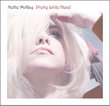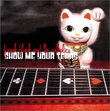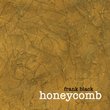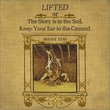| All Artists: Love Hall Tryst, John Wesley Harding, Kelly Hogan, Nora O'Connor, Brian Lohmann Title: Songs of Misfortune Members Wishing: 6 Total Copies: 0 Label: Appleseed Records Release Date: 7/26/2005 Genres: Country, Folk, International Music, Pop Styles: Traditional Folk, British & Celtic Folk, Singer-Songwriters Number of Discs: 1 SwapaCD Credits: 1 UPC: 611587108920 |
Search - Love Hall Tryst, John Wesley Harding, Kelly Hogan :: Songs of Misfortune
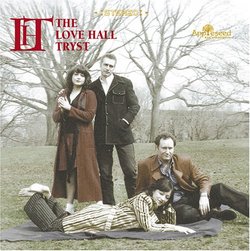 | Love Hall Tryst, John Wesley Harding, Kelly Hogan Songs of Misfortune Genres: Country, Folk, International Music, Pop
Why are British expatriate singer-songwriter John Wesley Harding, U.S. country/jazz/folk solo artists Kelly Hogan and Nora O?Connor and actor-vocalist Brian Lohmann singing traditional British folk songs in a converted ban... more » |
Larger Image |
CD DetailsSynopsis
Album Description Why are British expatriate singer-songwriter John Wesley Harding, U.S. country/jazz/folk solo artists Kelly Hogan and Nora O?Connor and actor-vocalist Brian Lohmann singing traditional British folk songs in a converted bank? In 1987, Wesley Stace, soon known as John Wesley Harding (a.k.a "Wes"), thought up the opening lines for a song about a foundling baby boy raised as a girl. Six years later the song was completed as "Miss Fortune" and frequently performed by Harding before and after its release on his 1998 CD, "Awake." But, says Harding, "When you sing a song for years onstage?you think about the song. The one thing I thought about that song is that I never ended it. What about that character?" Wes answered his own question by writing a huge 19th Century historical novel, "Misfortune," published under his original name in 2005 to acclaim in USA Today, Entertainment Weekly, and other publications. The book is studded with traditional British folk songs adapted by Harding, and some camouflaged original compositions. These songs "demanded to be sung in a very specific way," says Wes, so he convened The Love Hall Tryst, a mostly a cappella quartet comprising himself, friend and occasional collaborator Hogan, her favorite singing partner, O?Connor, and bass singer Lohmann. They used the Troy, NY, Savings Bank, a cavernous recording hall with incredible natural reverb. Like its source, "Songs of Misfortune" isn?t exactly a romp in the Victorian meadows. Wes says, "None of (the old songs) have happy endings." Greed, envy, treachery, and murder are on full display here. But redeeming these tales are the ringing voices of the Tryst ? cascades of mesmerizing harmonies surround the melody lines shared by all four singers. Even the grimmest scenarios are enlivened by the beauty of the vocals and the authenticity of presentation. Two songs appear in both unaccompanied and blazing, Fairport-ish electric versions, the latter provided by The Minstrel in the Galleries, Harding?s occasional "mediaeval rock" band of Seattle musicians. Whether or not you?ve read Harding?s novel, "Songs of Misfortune" stands on its own as a daring, rewarding adventure in musical scholarship, sublime arrangements and the eternal strength of the human voice. Similar CDs
Similarly Requested CDs
|
CD ReviewsStellar Brit folk E. C Goodstein | Northern CA United States | 08/08/2005 (5 out of 5 stars) "I can't add much to the editorial review. This is maybe a surprise but a great folk album, in okay 'retro' style-- but so 'old' it's new again! They do remind of The Young Tradition (& just a bit of The Weavers), but in some ways the vocals even better. And Harding's bonuses w. band do kinda channel Fairport Convention if with slightly modern twists too. And very nice to hear Nora O'Connor & Kelly Hogan singing a different repertoire. Surprising, but very engaging project-- I hope they record again!" Small Gem in Wes's Treasure Chest Dennis Howes | Sacramento, Ca United States | 03/02/2006 (5 out of 5 stars) "If this CD and the Misfortune book were the only thing John Wesley Harding ever did, it would be enough to label him a modern artistic genius. His wit and humor made me a big fan 12 years ago. Check out his CD's..start with "Why We Fight" or if you enjoy "Songs of Misfortune" try "Trad Arr Jones". He also has free downloads of music on his web site. Better yet catch a live show." A Miracle Dipsy Doodle | Chicago, IL | 11/14/2005 (5 out of 5 stars) "
I just loved this record. I didn't really know much about it going in, though I had read the novel to which it is attached - but this is simply a beautiful record of well-arranged and wonderfully recorded A Capella music. These are mainly traditional folk songs, but also some fake old songs (found in Misfortune) and a haunting cover of Leonard Cohen's superb Joan of Arc. This CD really took my by surprise." |

 Track Listings (13) - Disc #1
Track Listings (13) - Disc #1
